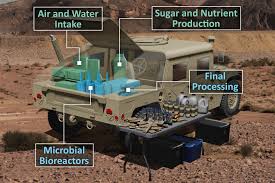
Breaking News
 China's Nightmarish New Bio Weapon Targets Race and Ethnicity
China's Nightmarish New Bio Weapon Targets Race and Ethnicity
 The Epstein Files Just EXPOSED the AI Mind Control Agenda (2026 Warning)
The Epstein Files Just EXPOSED the AI Mind Control Agenda (2026 Warning)
 Maxwell offers testimony if granted Trump clemency
Maxwell offers testimony if granted Trump clemency
 How RFK Jr's Guidelines Could Change Farming - Joel Salatin
How RFK Jr's Guidelines Could Change Farming - Joel Salatin
Top Tech News
 SpaceX Authorized to Increase High Speed Internet Download Speeds 5X Through 2026
SpaceX Authorized to Increase High Speed Internet Download Speeds 5X Through 2026
 Space AI is the Key to the Technological Singularity
Space AI is the Key to the Technological Singularity
 Velocitor X-1 eVTOL could be beating the traffic in just a year
Velocitor X-1 eVTOL could be beating the traffic in just a year
 Starlink smasher? China claims world's best high-powered microwave weapon
Starlink smasher? China claims world's best high-powered microwave weapon
 Wood scraps turn 'useless' desert sand into concrete
Wood scraps turn 'useless' desert sand into concrete
 Let's Do a Detailed Review of Zorin -- Is This Good for Ex-Windows Users?
Let's Do a Detailed Review of Zorin -- Is This Good for Ex-Windows Users?
 The World's First Sodium-Ion Battery EV Is A Winter Range Monster
The World's First Sodium-Ion Battery EV Is A Winter Range Monster
 China's CATL 5C Battery Breakthrough will Make Most Combustion Engine Vehicles OBSOLETE
China's CATL 5C Battery Breakthrough will Make Most Combustion Engine Vehicles OBSOLETE
 Study Shows Vaporizing E-Waste Makes it Easy to Recover Precious Metals at 13-Times Lower Costs
Study Shows Vaporizing E-Waste Makes it Easy to Recover Precious Metals at 13-Times Lower Costs
Mission from DARPA: Create food from thin air

For a team of Johns Hopkins researchers, the challenge of feeding people during times of crisis or conflict is an opportunity to dramatically reinvent how food is made: out of almost nothing.
The Johns Hopkins Applied Physics Laboratory is home to one of four teams selected for the Defense Advanced Research Projects Agency's (DARPA) Cornucopia program, attempting to unlock the potential to produce nutritionally complete, palatable foods in the field. The group is using electricity to capture water, carbon dioxide, nitrogen and trace minerals from the air and then producing a rich, glucose-based material (called feedstock) on which to grow microbial food products.

 Smart dust technology...
Smart dust technology...

